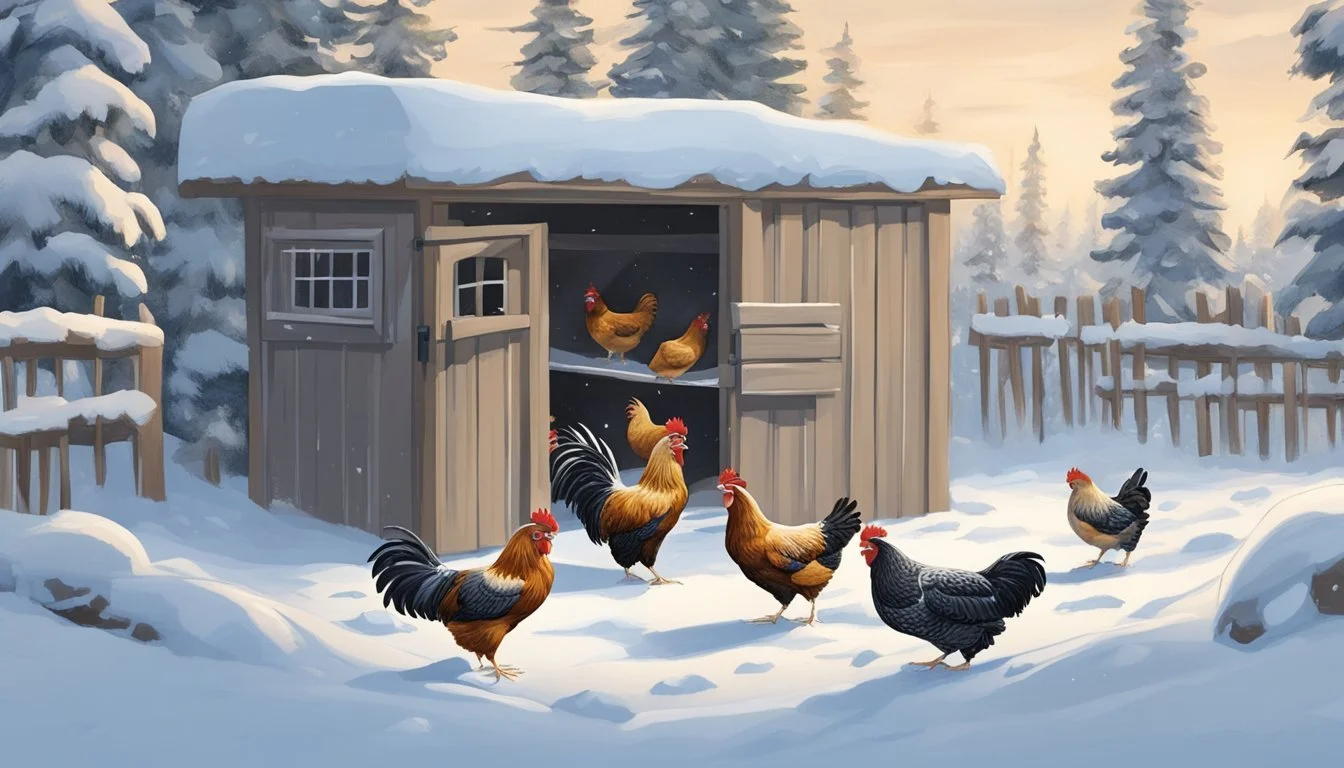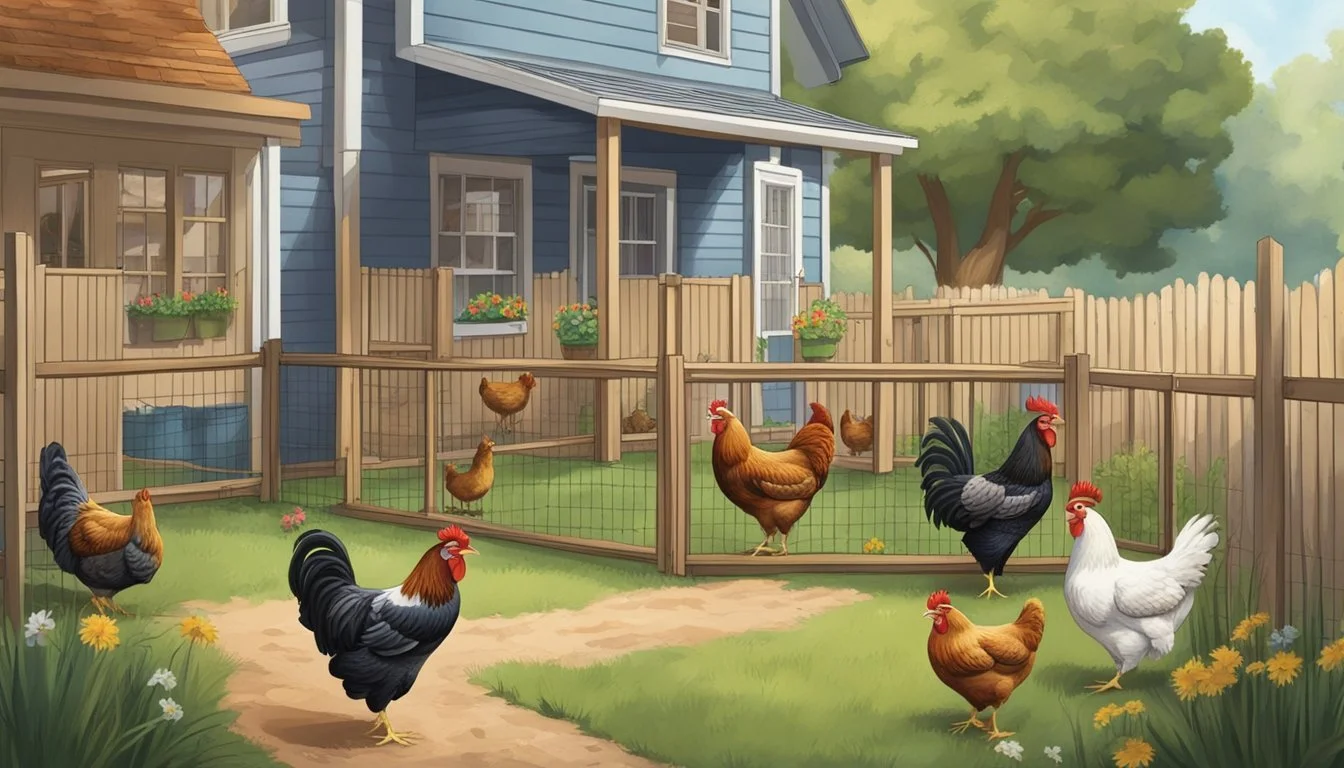Keeping Backyard Chickens in Anchorage, AK
Essential Tips for a Healthy Flock
Keeping backyard chickens has become an increasingly popular endeavor in Anchorage, Alaska, as residents seek a more sustainable and personal connection to their food sources. The trend speaks to a larger movement across many urban areas where municipal codes are adapting to allow for small-scale, residential agriculture. In Anchorage, the Municipal Code clearly stipulates the conditions under which poultry may be kept, promoting responsible husbandry within the city limits.
The Municipality of Anchorage permits the keeping of chickens in residential areas under specific guidelines to ensure harmony within neighborhoods and the well-being of the chickens. Local ordinances allow residents to keep a limited number of chickens – typically up to six – provided they are not kept for commercial purposes. This offers families the opportunity to produce their own eggs and, for some, to enjoy the appeal of raising their fowl.
As part of the community's effort towards sustainable living and self-reliance, these regulations have been well received by local chicken enthusiasts. Proper management and care are essential, not only for the health and happiness of the backyard chickens but also to keep in line with legal expectations and maintain good relations with neighbors. The balance struck by Anchorage's regulations underscores a shift towards localized food production and an embracing of backyard agriculture in Alaskan cities.
Understanding Local Chicken Ordinances
The Municipality of Anchorage has defined laws for the keeping of backyard chickens to ensure the welfare of the animals and consideration of neighbors. These local ordinances vary based on zoning areas and property size.
Alaska Chicken Ordinances and Regulations
In Anchorage, residential zones—excluding R-4 zoning and mobile home parks—are permitted to keep chickens. Specific regulations stipulate that residents:
Can keep up to six domestic fowl, including chickens, for non-commercial purposes.
Must provide a coop or enclosed area that is at least 10 square feet in size and is predator-proof.
Permit Requirements for Keeping Chickens
To keep chickens in Anchorage:
No permit is required for personal use, as long as individuals comply with the Anchorage Municipal Code (AMC).
The number of chickens allowed is based on lot size: 5 chickens are permitted for a 6000 sq ft lot, with the allowance of one additional chicken for every 1000 sq ft beyond that.
Property Line and Location Considerations
Residents must ensure their chicken coops or enclosures do not impinge on their neighbors' properties or enjoyment. Therefore, it is crucial to:
Maintain a proper distance from property lines, as regulated by local zoning codes.
Verify any additional neighborhood-specific restrictions or HOA rules before setting up chicken enclosures.
Setting Up Your Chicken Coop
In Anchorage, AK, setting up a chicken coop requires careful planning, both for the comfort of your chickens and to remain in compliance with local regulations. Pay attention to choosing the right location, designing for harsh winters, and maintaining cleanliness.
Choosing the Right Location for Your Coop
The ideal location for a chicken coop strikes a balance between compliance and chicken well-being. It must be:
At least 10 feet from the property line, to adhere to local ordinances.
Safe from predators and well-drained to prevent water accumulation.
South-facing if possible, to maximize sunlight exposure which is crucial during Anchorage’s shorter winter days.
Coop Design and Winterization Tips
Designing a coop in Anchorage should focus on insulation and ventilation to keep chickens warm and healthy during winter months. Key considerations include:
Insulation: Walls should have quality insulation to retain heat.
Ventilation: Proper ventilation prevents moisture buildup, crucial in preventing frostbite.
Coops should also be predator-proof and have an enclosed space of at least 10 square feet.
Maintaining Cleanliness and Preventing Odors
Keeping a coop clean is vital for the health of the chickens and to control odors, particularly in urban settings. Regular maintenance should include:
Daily: Remove and replace soiled bedding.
Weekly: Clean feeders and waterers.
Monthly: Conduct a thorough cleaning of the entire coop.
Use of absorbent materials such as straw or wood shavings will help keep the coop dry and odor-free.
Chicken Care and Management
In Anchorage, AK, successful chicken care and management requires a thorough understanding of specific feeding practices, health monitoring, and egg handling to ensure the wellbeing of hens and chicks.
Feeding and Nutrition
Proper nutrition is crucial for the health and productivity of backyard chickens. Owners should provide a balanced diet consisting of:
Layer Pellets: These are formulated to meet the nutritional needs of laying hens.
Grit: Chickens require grit to aid in digestion, as they do not have teeth to grind food.
Calcium Sources: Items such as oyster shells can be given to help hens maintain strong eggshells.
Clean Water: Access to fresh, unfrozen water is vital, especially during the cold winters in Anchorage.
It's important to feed chickens a consistent, appropriate amount of food. Overfeeding can lead to obesity and health issues, while underfeeding can cause nutritional deficiencies.
Health Monitoring and Veterinary Care
Routine health checks are critical for preventing and identifying diseases or parasites. A few key practices include:
Observation: Regularly observing chickens for signs of distress or illness such as changes in behavior or appearance.
Parasite Control: Implementing a parasite control program to prevent issues such as mites and lice.
Vaccinations: Discussing necessary vaccinations with a veterinarian to protect against common poultry diseases.
Shelter: Ensuring that chickens have a clean, safe, and warm shelter during winter months to prevent frostbite and other cold-related issues.
Veterinary care should be sought if any signs of disease or abnormal behavior are detected.
Handling Eggs and Egg Collection
Eggs should be collected frequently to ensure their freshness and to deter hens from becoming broody.
Collect eggs at least once a day, twice if possible.
Clean any dirt off eggs with fine sandpaper or a dry cloth; avoid using water which can remove the protective bloom.
Store eggs in a cool, consistent temperature before use or sale.
By adhering to these management practices, those raising chickens can maintain a healthy flock in the unique Alaskan environment.
Understanding and Managing Poultry Behavior
Keeping backyard chickens requires knowledge of their social dynamics and behaviors. This is essential for maintaining harmony in the flock and facilitating a peaceful and productive environment.
Social Structure and Pecking Order
Chickens maintain a complex social structure known as the pecking order, which is a hierarchy determining their access to resources. Hens typically establish this hierarchy through pecking and other displays of dominance. It is important for keepers to recognize signs of distress or aggression, as they may indicate disruptions in the pecking order that need to be addressed to prevent injury and stress among the birds.
New chickens should be introduced to the flock carefully to avoid aggressive confrontations. Providing ample space, food, and water stations can reduce competition and help maintain the flock's equilibrium.
Coping with Roosters and Noise Control
Roosters are known for their crowing, which can pose noise challenges, especially in urban settings like Anchorage. Nonetheless, they play a crucial role in flock management by protecting hens and facilitating breeding.
To mitigate noise, keepers can:
Design the coop to muffle sound, using dense materials and strategic placement away from neighbors.
Employ no-crow collars, which while controversial, can reduce the volume of crowing without causing harm to the rooster when used correctly.
Understanding rooster behavior is essential for keepers. Roosters may crow to assert dominance or respond to threats. Reducing stimuli that trigger crowing can also help manage noise levels. Moreover, while having a rooster is not essential for egg production from hens, they can contribute to flock security against potential predators, an important consideration in areas with wildlife like Anchorage.
Mitigating Risks from Predators
Anchorage, AK poses unique challenges for backyard chicken keepers, primarily due to the presence of adept predators. Effective protection strategies are vital for ensuring the survival and well-being of the flock.
Identifying Common Predators in Anchorage
Predators in Anchorage, AK are diverse and adapted to the local environment. Notably, hawks represent a significant aerial threat to chickens. These raptors are skilled hunters and can strike from above, often without warning.
Red-tailed hawks
Northern goshawks
Bald eagles
Land-based predators include:
Coyotes
Foxes
Bears
Weasels
Each of these predators has unique hunting habits and poses a different threat to backyard poultry.
Protective Measures Against Hawks and Other Threats
To guard against aerial predators like hawks, chicken runs should be securely covered with a robust material. Wire mesh or netting serves the dual purpose of preventing birds from flying out and raptors from flying in. Additionally, providing shelter, such as shrubs or covered spaces within the run, gives chickens a place to hide in case of an attack.
For ground-based predators, the following steps can be taken:
Install sturdy fences that are buried at least one foot deep to deter digging.
Use half-inch welded wire to cover windows and vents.
Equip coop doors with raccoon-proof latches to thwart intelligent predators.
Consistent vigilance, coupled with the implementation of these protective measures, increases the safety of backyard chickens in Anchorage from the diverse range of local predators.
Legal Implications and Neighborhood Relations
In Anchorage, AK, residents considering backyard chicken keeping must navigate city ordinances to avoid fines and maintain positive relations with neighbors. Adherence to the specific regulations and consideration of property lines are essential for legal compliance and neighborhood harmony.
Dealing with Fines and Legal Challenges
The Municipality of Anchorage enforces ordinances that allow residents to keep chickens in accordance with certain conditions. Individuals must understand that failing to comply with these regulations may result in fines or legal challenges. The Anchorage Municipal Code (AMC) 17.45.010 specifies that up to six domestic fowl, including chickens, may be kept for non-commercial purposes if:
The chickens are housed in a coop or enclosed area.
The enclosure is at least 10 square feet in size.
The enclosure is designed to be predator-proof.
These rules are established to prevent nuisances and complaints from arising. Residents must also be aware that chickens must not be kept within mobile home parks or the R-4 residential zoning area.
Maintaining Good Neighbor Relations
Good neighbor relations are key when raising backyard chickens. Residents must consider their neighbors and property lines to ensure their hobby does not become an inconvenience or point of contention. To maintain good relations, chicken keepers should:
Keep the coop clean to avoid odors and pests.
Ensure noise levels are minimized, particularly from roosters.
Position chicken coops thoughtfully, respecting neighbor's space and property lines.
Engage in open communication with neighbors about the intent to keep chickens and how any concerns can be addressed collaboratively.
By fostering a considerate and communicative atmosphere, residents can help create a community that is supportive of backyard chicken keeping while respecting everyone's right to enjoy their own property.
Conclusion
In Anchorage, the practice of keeping backyard chickens has become a welcomed trend for various reasons including food sustainability and personal enjoyment. Residents interested in this endeavor should take note of relevant regulations to ensure compliance and avoid penalties.
Key Considerations:
Residents may keep up to six chickens.
Roosters are commonly prohibited to avoid noise disturbances.
Adequate shelter is required, with a minimum of 10 square feet per bird.
Predator-proof coops and runs are essential for protecting chickens from wildlife.
It's crucial for prospective chicken keepers to construct secure and spacious coops as mandated by local laws. They must also remain vigilant in safeguarding their flocks from common predators such as hawks by ensuring their runs are covered.
Advantages of Backyard Chickens Include:
Fresh eggs that are readily available.
Potential reduction in food costs.
Organic pest control as chickens consume various insects.
An interactive experience that can be educational for families.
To maintain a healthy and happy flock, individuals must commit to routine care, disease prevention, and proper feeding. They must prepare for the challenges posed by Alaska's unique climate, particularly during the winter months.
In summary, backyard chicken-keeping in Anchorage offers several benefits and poses distinct challenges. Through proper management and adherence to local regulations, residents can enjoy the rewards of raising chickens in their backyards.





